I’m loath to call Jeff Lieberman’s 1981 debut into the slasher genre a disappointment. Saying that a film is a disappointment is tantamount to saying that the movie is bad, but Just Before Dawn isn’t bad at all; in fact, it’s a criminally underrated horror film. The problem is that the slasher genre is filled with knock-offs. If an obscure film is seen as being too similar to a better-known film, it can unfairly suffer. Despite great performances, stunning cinematography, and some chilling scenes, Just Before Dawn fails to distinguish itself from the better and better-known horror films.
The film follows a group of young friends: Constance (Deborah Benson), a reserved, but experienced, camper; Warren (Gregg Henry), her self-assured boyfriend; Jonathan (Chris Lemmon), the token clown; Megan (Jamie Rose), Jonathan’s vain girlfriend; and Daniel (Ralph Seymour), Jonathan’s nerdy photographer brother. The friends are camping out in a piece of land that Warren owns, but are warned by a forest ranger (George Kennedy) of nonspecific dangers in the mountains. A more specific warning comes from Ty (Mike Kellin), a hunter, whose cousin was killed by “a demon”. Ty begs them to turn around and take him with them, but they dismiss him and point him towards Roy’s cabin. When the group arrives at the campsite, they receive their final warning, this time from a family of hillbillies, who also warn them of “raising the devil”. Even this fails to shake the group, and one by one, they come to face to face with a wheezing, giggling, giant wielding an enormous machete.
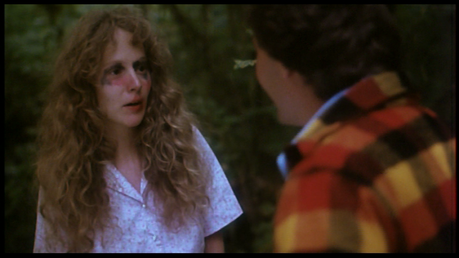
As well as Lady Gaga's redneck cousin.
The reviews praising the film’s visuals drew me to Just Before Dawn initially, and on this, Dawn does not disappoint. I could be cynical and place the responsibility solely on the beautiful locations, but this would be denying the excellent work by cinematographers Dean and Joel King. While a beautiful setting helps, camera angles, camera movement, and scene composition are what create great cinematography. The mise en scene goes a long way in creating the tense atmosphere.
Much like John Carpenter’s Halloween, the killer is often seen in the background, unnoticed by the characters and just out of focus. This gives the audience a sense of unease; it’s as if the killer could appear at any moment. Very rarely does the killer pop out into the screen, instead he slithers into frame, unnoticed by the viewer at first. Once the audience realizes the killer is in the background, we have to wonder how long he’s been there, watching us. Rather than give us an endless parade of jump scares and gory money shots, Lieberman and crew give us a sense of unease that lets us know there is nothing safe in the world.
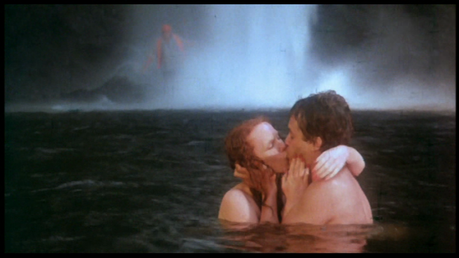
Behind you!
When it comes to delivering scares, sound is just as important as sight. Brad Fiedel proves once again that synthesizers are the best instruments for creating effective slasher soundtracks. The main theme, with its eerie whistling and low synth chords, is creepy without being distracting. Much like the visuals, the score doesn’t jump out at you; instead it slinks into the scene, building with intensity as the danger grows. Beyond the score in the proper sense, the film is filled with strange sounds, such as the sounds of crying animals, which adds to the dread. Creepiest of all is the strange giggle/wheeze that the killer makes; especially in the opening kill, where all you can see is the victim’s face being caressed by the machete. Alone, the sight would be a little chilling, but mixed with the utterly bizarre and animalistic sounds of the killer, it’s is absolutely terrifying.
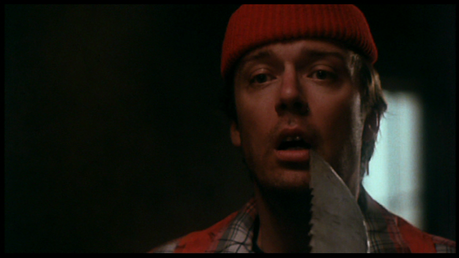
Don't put it in your mouth; you have no idea where that's been!
So much works in this film that the flaws are even more apparent. There are two major flaws in the film: the first being pacing. This is a slow film for the genre– after the opening kill, no one dies until halfway in. In itself, this is not a bad thing; slow builds can create the greatest intensity. The problem is that the film never seems to pick up the pace, even during the climax. Lieberman does a great job creating suspense while the killer stalks his victims, but he doesn’t deliver with the actual killing. The kills themselves are decent, but they don’t last very long, and fail to match the buildup Lieberman created in the first half. There is no gradual realization that’s something wrong, no paranoia, and no thrilling hide-and-chase scene. Until the climax, the victims are unaware that they are being stalked, and they are dispatched in quick fashion with little chance to defend themselves. Bizarrely, the climax felt slow, even though it involved a fight for survival, and an extremely creative kill. There was no panic. We just see the action unfold.
The other ‘flaw’ isn’t really a flaw in the technical sense: outside of being incredibly well made, there isn’t much that distinguishes Just Before Dawn from the countless other slashers. While one would think that being well made is a distinguishing feature, but the fact of the matter is that, when it comes to “rednecks vs. city slickers” horror movies, The Hills Have Eyes and The Texas Chainsaw Massacre did it first, and both movies did it best.
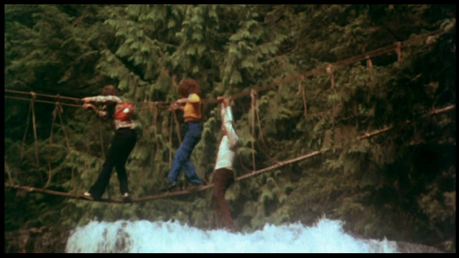
The sad part is the film didn’t have to be this way. In the featurette for the movie, Lieberman states that the original script featured heavy religious imagery, and the climax would involve snake handling. You can still see remnants of the original script in many elements, such as the constant mention of “demons” in the dialogue, and the use of a church as the focal point in many scenes. While there’s no way to know how well the original script would have worked as a film, there’s no denying that a religious-themed slasher movie–especially a religiously themed slasher with no hint of the supernatural– would definitely make the movie more memorable and interesting.
Despite its slow pacing and generic themes, Just Before Dawn is a movie that deserves a viewing. It’s visually stunning, creepy (at least in the first half), and has believable characters played by talented actors. While horror fans may lament its relatively obscure status, at least there’s a silver lining: it’s not likely to get an awful remake.
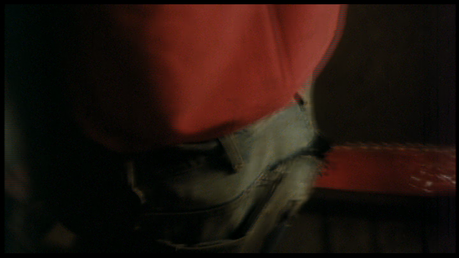
Great, you ruined a perfectly good pair of pants!
By Marshall Oliver Estes 7/26/2011

